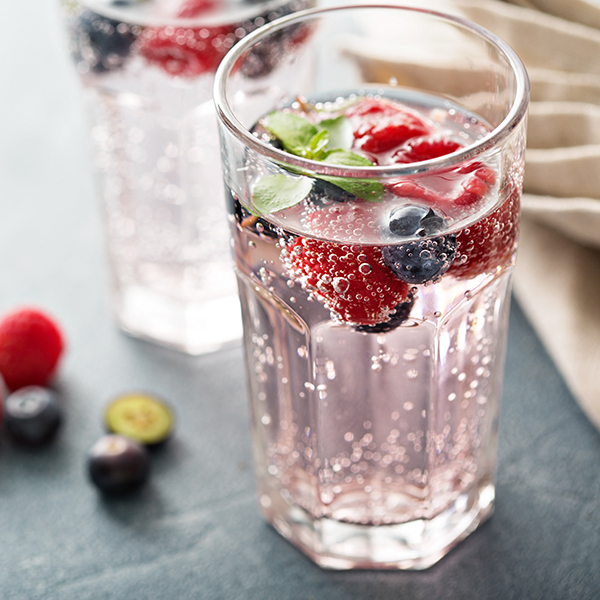Retail sales of some specialty beverages took a hit during the early months of the pandemic, although retailers report that sales have rebounded, and the outlook is bright for enhanced waters and drinks that consumers perceive as supporting their overall health and well-being.
Shelf-stable functional beverages were one of the weakest-performing specialty food categories from 2018-2020, with sales declines of about 11 percent, according to the most recent State of the Specialty Food Industry Report, which attributed the weakness to fewer consumers eating lunch at the office and fewer students on campus.
Sales of specialty refrigerated functional beverages and juices were up about 8 percent in that time frame. This lagged behind the sales growth of many other specialty beverage categories, such as ready-to-drink tea and coffee.
Specialty waters, especially flavored varieties, have continued to perform well. Sales were up 34.6 percent for flavored uncarbonated waters and 26.9 percent for flavored sparkling waters from 2019-2020, according to the report. Unflavored sparkling waters also performed well, with sales up 20.5 percent, while enhanced waters grew at only a 0.8 percent rate from 2019-2020.
The report projected a compound annual growth rate of 4.4 percent for the 2021-2025 time frame for specialty waters.
Some retailers are reporting strong growth for both functional beverages and enhanced waters since the early days of the pandemic.
Christine Dang, category manager at online specialty grocery retailer Thrive Market, said Thrive has expanded its offerings in the functional beverage category significantly during the last two years amid strong consumer demand.
“Consumers were looking for better-for-you options with a low sugar content and functional ingredients while still delivering on taste,” she said. “We have since doubled our assortment and have experienced triple-digit growth on our platform.”
In fact, Dang said, enhanced waters and functional beverages have been the fastest growing category within the overall beverage lineup at Thrive. Sales of sparkling beverages have been particularly strong, and account for 15 percent of Thrive’s sales in the beverage category.
“We have seen the sparkling sodas experience the most growth not just on our platform but throughout the marketplace,” she said. “A lot of these emerging sparkling soda brands have used ingredients like prebiotics and probiotics that focus on gut health, which has been linked to many health benefits that our members can recognize.”
These sparkling sodas provide a more healthful alternative to classic soft drinks that tend to have more sugar and calories, Dang said.
Among enhanced waters, Thrive is seeing growth in varieties that have unique flavors and ingredients derived from herbs, fruits, and flowers.
“Most of the sparkling water brands you find typically default to the standard flavors like lemon or lime, but emerging brands like Aura Bora showcase sparkling waters with flavors outside of the box, like their Cactus Rose,” said Dang.
The State of the Specialty Food Industry report cited innovation in water featuring herbal/botanical ingredients; Asian fruits such as lychee, calamansi and yuzu, and floral-forward notes. Other trends include eco-friendly packaging, tea infusions, and the expansion of sparkling brands in the adjacent hard seltzer category.
Kombucha, which was one of the pioneering functional beverage sub-categories, also continues to evolve. Boulder, Colorado-based functional beverage maker Rowdy Mermaid, for example, recently said it expanded its kombucha distribution into Costco for the first time, offering its Savory Peach Kombucha in six-packs, representing its first multi-pack product. The company also recently introduced its Hibiscus Pulse kombucha in Natural Grocers by Vitamin Cottage and in the Rocky Mountain region of Whole Foods Market.
More than half of adult consumers — 56 percent — report using functional beverages, according to The Hartman Group’s 2020 Functional Food & Beverages and Supplements report, which cites an overall trend toward self-care that has been accelerated by the pandemic.
Research from The Hartman Group shows that consumers are choosing functional beverages primarily for hydration, but also for energy, general prevention, digestion/microbiome, immunity, and other uses. In addition to the consumers who currently use functional beverages to address these conditions, a significant percentage said they would consider using them in the future. For example, while 15 percent of consumers said they consume functional beverages for general prevention, another 48 percent said they had an interest in doing so — an indication of the growth potential for beverage manufacturers.
The Hartman Group report found that consumers usually source functional foods and beverages at the same stores where they buy groceries. These consumers, however, tend to shop in wellness- and convenience-oriented channels.
Other findings from the Hartman Group report:
• Brands that specialize in functionality tend to be a little more trusted, but consumers are open to more mainstream entrants and private label.
• Consumer interest in functional foods and beverages spans a range of benefits and categories. They prefer products that make healthy eating easier, with products in categories they habitually consume.
• Functional beverages can combine some indulgent attributes, but consumers tend to select based on the specific occasion — whether it is an intentional departure from healthy eating or a more purely health-driven occasion.
Related: Sprouts Sources Chlorophyll Water; Sprouts to Stock Mananalu Water.

